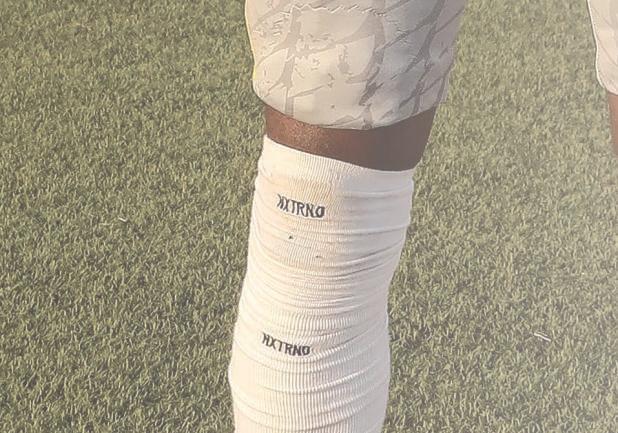


















Put respect on the Queen’s name
Queen Latifah’s recent performance of the Star-Spangled Banner during an NFL game between the Giants and Cowboys sent shockwaves across the internet. Despite her numerous singing accolades, it appeared that many were still unaware of her vocal prowess. Fans flooded social media with a mix of astonishment and reminders of her previous musical achievements.

One person on Twitter exclaimed, “People are JUST finding out that Queen Latifah sings? Have they not seen ‘Chicago’ or ‘Hairspray’? Or saw that she released two jazz albums? Or even when she played Bessie Smith in that HBO movie?”
Laura Onyenehoher journey from winning a 500 title to a 1000 title, culminating in her triumphant moment with the U.S. Open trophy. She radiated confidence and resilience, symbolizing the bright future of tennis. Gauff humbly credits her success to Serena and Venus Williams, who paved the way for young talents like her to believe in their dreams, highlighting the importance of representation and the enduring legacy of Black women in sports. Black women are one of one. They set the bar, the trends, and their resilience in the face of adversity needs to be a case study for a PhD dissertation. I can’t wait to see the growth this rising star will have in the years to come.
Some folks had no shame in displaying their ignorance. One Twitter user commented, “Y’all dragging it lmao she is not famous enough for anything, especially singing, to do all this.”
Queen Latifah’s remarkable talent extends beyond singing; she is also one of the most influential female emcees in hip-hop, making her mark in a male-dominated industry and paving the way for other women to succeed. It’s unfortunate that some individuals in this generation may have shallow knowledge about the trailblazing Black icons who paved the way for their favorite female rappers today. Queen Latifah’s list of accomplishments speaks for itself, including an Oscar nomination, a Grammy, a Golden Globe, Screen Actors Guild Awards, NAACP Image Awards, and a Primetime Emmy. Put some respect on the Queen’s name.
At 19-years-old, Coco Gauff has achieved a historic milestone by becoming the youngest U.S. Open champion since Serena Williams won the event at age 17, in 1999. Not only did she make an indelible mark on the tennis world, but she also stood up against implicit anti-Black bias in American sports. During her victory speech, Gauff graciously acknowledged those who doubted her, stating, “Honestly, thank you to the people who didn’t believe in me… a month ago, I won a 500 title, and people said I would stop at that. Two weeks ago, I won a 1000 title, and people were saying that was the biggest it was going to get.” She emphasized
VP Harris hosts epic hip-hop house party at White House

Vice President Kamala Harris pulled out all the stops, bringing together over 400 guests for an unforgettable party honoring hip-hop’s 50th anniversary. With luminaries such as Lil Wayne, Common, Jeezy, Fat Joe, Remy Ma, Doug E. Fresh, Slick Rick, MC Lyte, and Wale performing their iconic hits on the front lawn of Harris’ residence in Washington D.C., the event was a dazzling spectacle of talent and culture. The highlight of the night was Vice President Harris herself, who, clad in a vibrant 90s-inspired multicolored shirt and high-waisted pink pants, surprised everyone by dancing energetically to Q-Tip’s 1999 hit “Vivrant Thing.” Her moves and outfit perfectly captured the spirit of the occasion, showcasing the enduring influence and evolution of hip-hop over the decades. It was a night that left a profound impact and showcased the power of this cultural phenomenon. As fun as it was to experience this from the comforts of my laptop, it’s great to see the influence and growth this genre has achieved throughout the years. They need to throw these parties every quarter and the Defender needs a special invite. That’s all I’m saying!
ON THE WEB

• Top 7 prostate cancer warning signs & symptoms.
• We’re getting ready for Bey Day!
• Now playing: Defender Video on Thursday.
Two Harris County courts have recently received grants to establish full-time eviction diversion eforts later this year. For some, this may not sound like a big deal. But for many, these diversion eforts could mean the diference between remaining housed or being a member of the newly homeless.
Tanks to the judges, the National Center for State Courts (NCSC), the judges, the that will cover one-and-a-half years of salary for two full-time positions — one for each court — that will focus on collecting data and implementing strategies aimed at reducing the harm of eviction, according to Duble.
“We want to build on the lessons we learned during the pandemic and adopt best practices from that,” Duble said. “We have to work with and engage landlords and tenants and all the various groups that are involved in the eviction process.”
The negative impacts of the COVID-19 pandemic, according to medical professionals, have yet to be fully calculated or comprehended. But what is certain is the positive thing to emerge during that horrendous global health event – pandemic protections for renters, allowing individuals and families to remain housed during difcult fnancial times.
Tese protections were an absolute God-send for many in Houston, the city ranked eighth in the nation in terms of numbers of long-term renters as calculated by an analysis of U.S. Census Bureau housing data of more than 300 cities. However, since those renter pandemic protections ended eviction rates in Houston have skyrocketed. According to data compiled by researchers at Eviction Lab, the Houston metro area has seen 42% more eviction flings in the last year than a typical year before the pandemic. Since January
2020, nearly 203,000 eviction cases have been fled in Harris County, according to data from January Advisors. So far, in 2023 alone, nearly 54,000 cases have been fled.
Tese numbers represent a historic high for the city. But the numbers also represent people on the razor’s edge of being housed or not.
Duble and Lozano’s courts will join 22 state and local
municipalities across the country to join NCSC’s four-year Eviction Diversion Initiative: a $11.5 million grant program that aims to provide “an opportunity to learn from and improve upon pandemic-era best practices and to create permanent changes to their high-volume, high-impact eviction dockets,” according to the organization’s website.

Harris County Clerk Teneshia Hudspeth recently deputized election clerks as one of her frst calls of action as the County’s Chief Election Ofcial to ensure a smooth transition and avoid any disruptions or delays in the ongoing work related to the conduct of the November 7, 2023 election.
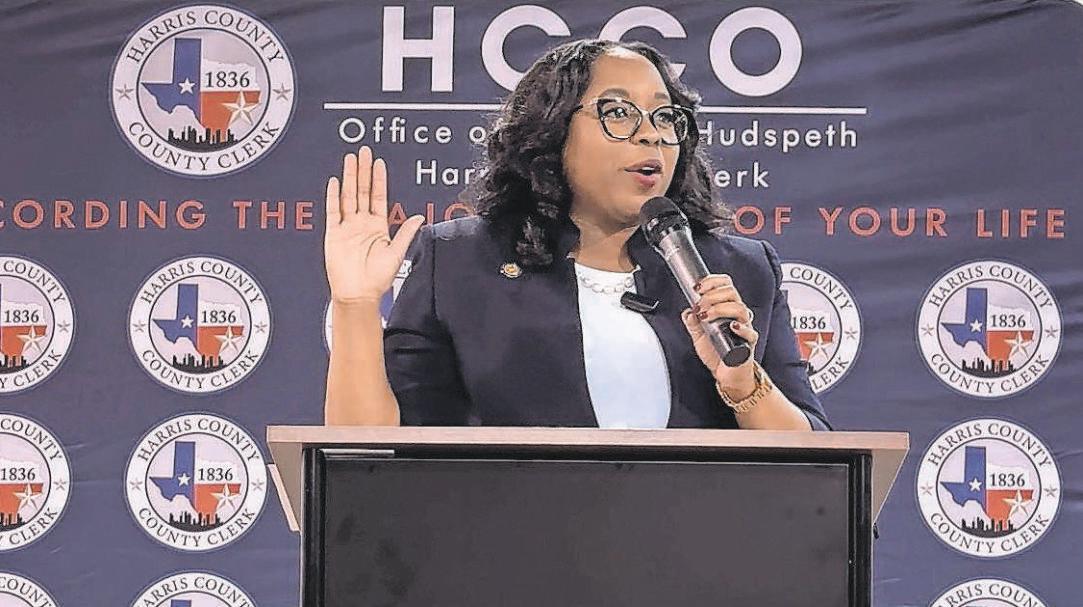
Texas Senate Bill 1750 went into efect Sept. 1, abolishing the Election Administrator’s Ofce and returning election management to the County Clerk and voter registration to the Tax Assessor-Collector.
“Our ofce has entered a new, but familiar era, as we welcome the Elections Department back to the Harris County Clerk’s Ofce,” said Hudspeth. “Rest assured that while a change in leadership has occurred, the mission remains the same.”
Hudspeth’s objective is to conduct elections with a non-partisan spirit, provide all voters with the information, materials, and assistance needed to vote, and work to strengthen voters’ confdence in the election process in accordance with state and federal election guidelines.
“Many things have changed since election management duties were removed from the County Clerk’s Ofce three years ago. Te voting equipment and the environment in which elections are conducted have changed,” she said. “Together, we will build on any progress made and continue to address the challenges that remain to ensure the conduct of well-organized, transparent, and fair elections.”
Election information can be found at www.harrisvotes.com.
The racist motivations of the white shooter who targeted and fatally shot Black people in Jacksonville, Florida, two weeks ago have revived concerns about the threat of hate violence and domestic terrorism against African Americans.
Most hate crime victims in the U.S. are Black, and that has been the case since the federal government began tracking such crimes decades ago. But national attention on the rate of Black victimization is heightened in the wake of mass casualty racist attacks, like those in recent years at a supermarket in Buffalo, New York, and a historic Black church in Charleston, South Carolina.
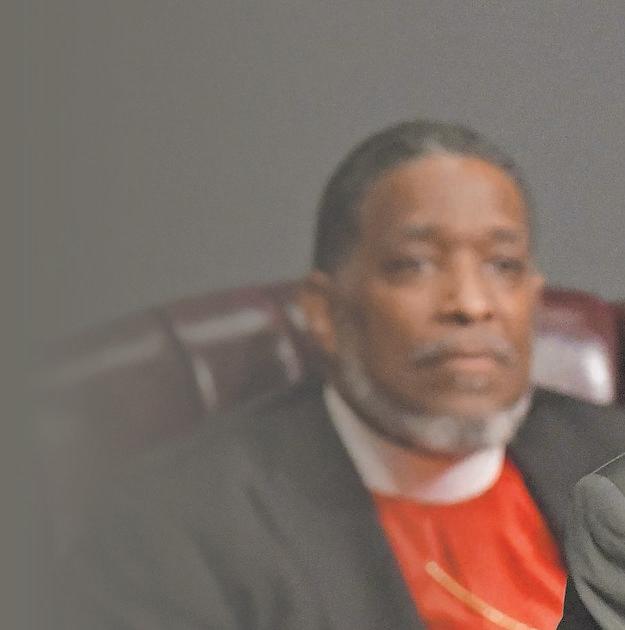
Now, as families in Jacksonville eulogize loved ones lost in a hail of bullets at a neighborhood discount store, activists across the nation are calling for better measures to counter the longstanding epidemic of hate violence against Black Americans.
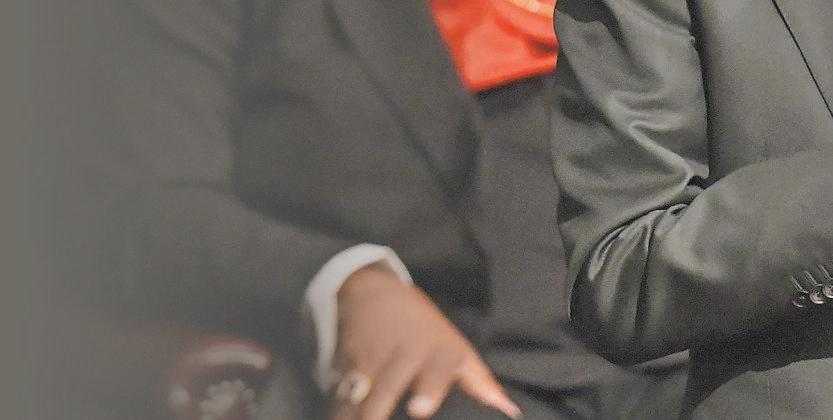
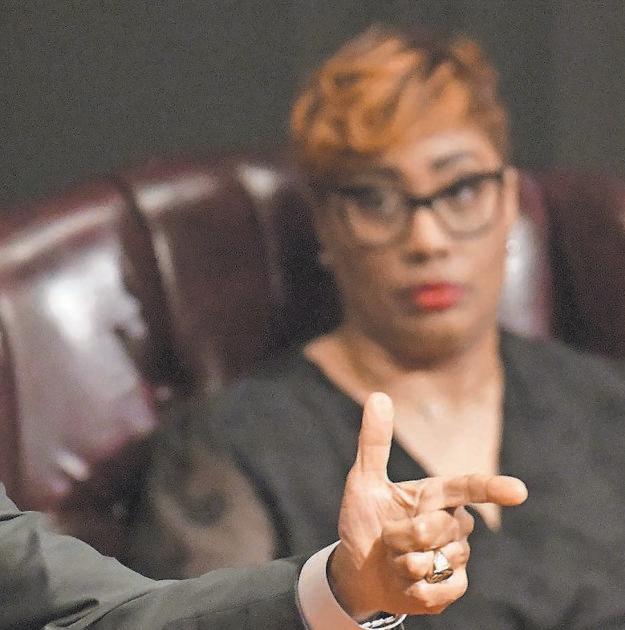
“How many people have to die, before you get up, whether you’re Republican or Democrat, and say we got to stop this,” the Rev. Al Sharpton asked as he eulogized Angela Carr, one of the victims of the gunman who shot down three Black people at a Dollar General
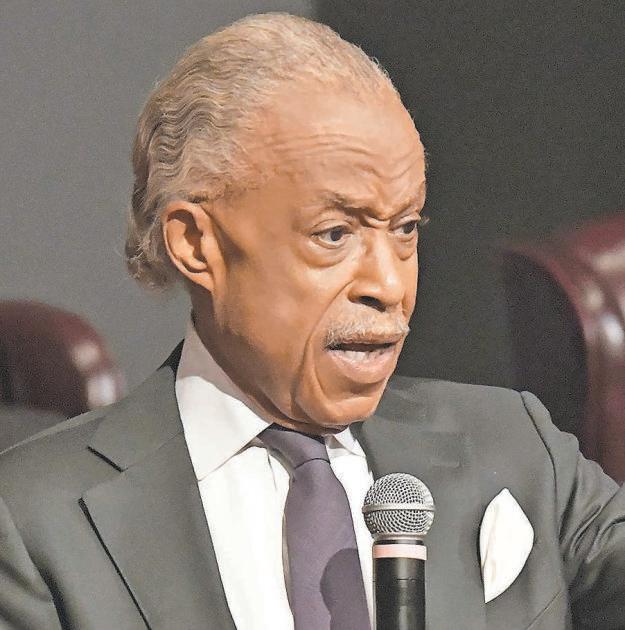
store in Jacksonville on Aug. 26.
Funerals were held in Florida over the weekend for the three victims. Sharpton pointed to reports of neo-Nazi demonstrations in Orlando, seen just days after the Jacksonville shooting, as evidence that a climate of hate has been fomented in Florida and across the U.S.
“Look at the data,” he said.
Anti-Black hate crimes peaked in 1996 at 42% of all hate crimes, then began a steady decline until 2020. June of that year was the worst month for anti-Black hate crimes since national record-keeping by the FBI began.
Brian Levin, director of the Center for the Study of Hate & Extremism at California State University, cautions that there are gaps in the agency’s reports that can present a misleading picture of hate crimes in parts of the country. Florida, along with Virginia, Mississippi and Arkansas, had the lowest reporting rates of hate crimes to the FBI in 2021.
“We generally see increases in hate crimes in election years and around catalytic events,” said Levin. “We’re talking about almost 500 to 700 more hate crimes in an election year. Politics seems to be a catalyst.”
Levin said there is substantial underreporting. Even with the
FBI’s revised reporting for 2021, the rate only captured 80% participation, he said.
“Imagine if we had even more,” he said.
In 1990, Congress passed legislation that required the Justice Department to collect data on crimes motivated by race, religion, sexual orientation and ethnicity. The FBI does the data collecting through the Uniform Crime Reporting Program.
But after years of collection, the problem of hate-motivated violence has increased over the last decade. The number of hate crimes in the U.S. jumped up in 2021 from an already alarming increase in the previous year, according to FBI data released in March.
Among the 2021 victims, 64.5% were targeted due to their race, ethnicity or ancestry. Another 16% were targeted over their sexual orientation, and 14% of cases involved religious bias.
Leaders from more than 30 national civil rights organizations sent a letter to the White House requesting a meeting with the Biden administration to address hate-motivated violence. If convened, it would be the first such gathering since a “United We Stand” summit with the president and administration officials
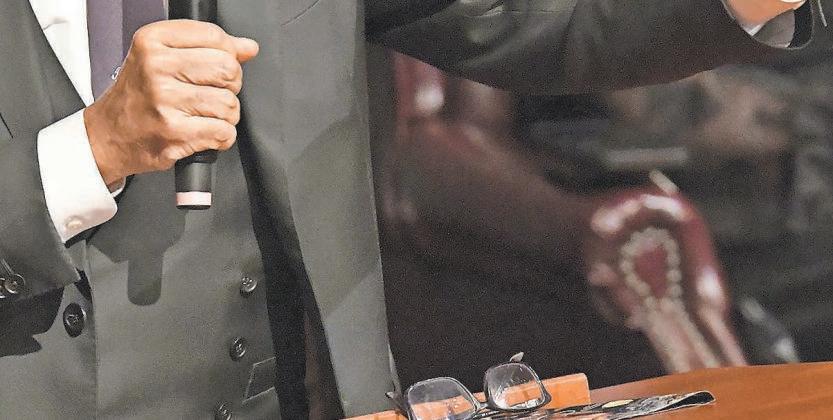
in September 2022. This time, the groups said they want to discuss steps that federal agencies other than the Justice Department could take to increase awareness of hate crimes and identify ways communities can respond to hate and violent white supremacy. They also requested a report detailing the administration’s progress since last year’s summit.
“As we approach the one-year anniversary of this summit, the latest mass hate crime — in which three Black people were murdered
at a store in Jacksonville, Florida — serves as a stark reminder of the repeated devastation that hate has on communities across the country,” reads the letter signed by organizations such as The Leadership Conference on Civil and Human Rights, Asian Americans Advancing Justice, the NAACP Legal Defense Fund, Inc. and the Anti-Defamation League.
“Our communities are facing an unprecedented threat from the hate-filled forces that seek to divide our nation,” the group wrote.
VOLUME 92, NUMBER 44 - SEPTEMBER 14, 2023
Publisher | CEO Sonceria Messiah-Jiles
Strategic Alllance Clyde Jiles
Digital Content Manager Get Current Studios
Managing Editor ReShonda Tate

Associate Editor Aswad Walker
Education Reporter Laura Onyeneho
Sports Terrance Harris
Jodie B. Jiles
Photographer Jimmie Aggison
Social Media Manager
Tia Alphonse Jordan Hockett


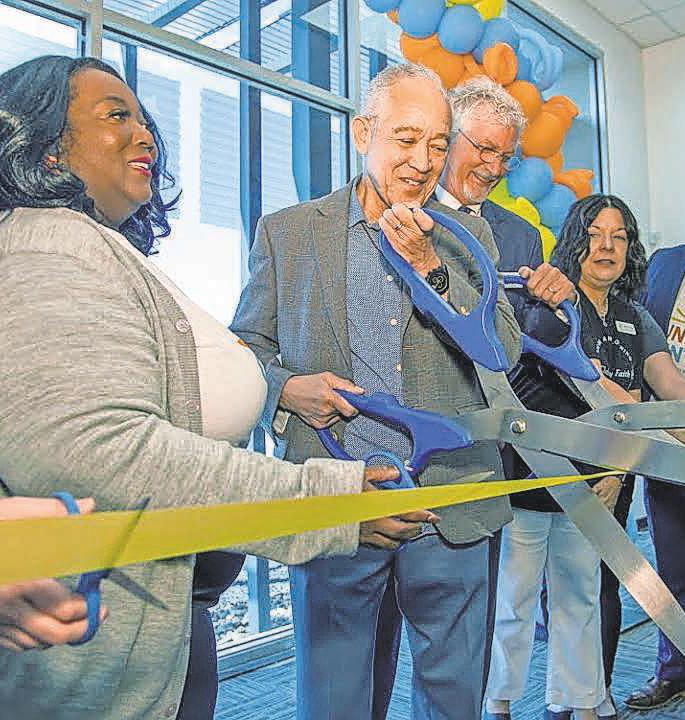
Te Houston Independent School District has opened the frst of six Sunrise Centers designed to serve students and families. Te move is part of the district’s Destination 2035 plan to make HISD the frst large district in the country to prepare all kids for the workplace and world of 2035. Sunrise Centers are intentional partnerships with existing community organizations and service providers. Tey are hosted in communities where HISD data shows there is the greatest need and community partners are selected based on data about the needs of students in that community. Te West Orem YMCA site will serve the communities surrounding Madison High School and will provide social-emotional support and mental health services case management, basic needs support, literacy and other academic supports enrichment. HISD plans to launch fve more centers by November 2023.


If your dream is to own a home, there is an event coming up in District B that you can’t miss. From Tursday, September 28 through Sunday, October 1, NACA, a national homeownership non-proft, will be helping people achieve their home ownership dreams. NACA provides mortgages with the lowest interest rates

in the country to low income people without considering their credit score. NACA also overcomes the lack of savings barrier since there is no down payment, no closing costs, or fees (these are paid by the lender), and no required mortgage insurance. NACA provides fnancial learning to help prospective homeowners fnd a home they can aford. Te homebuyer event will take place at Green House International Church, 200 W. Green Rd. Please register for the homebuyer event at https://www. nacalynx.com/naca/webfile/member/event/eventType. aspx?txtEvent=DI.
Te Houston Police Department is inviting Houston area high school students to apply for the 2023-2024 Youth Police Advisory Council (YPAC).In addition to providing a direct link to Police Chief Troy Finner, the YPAC experience also fosters a platform for students to address issues afecting them and their diverse communities, participate in service projects for the betterment of our city and attend youth leadership conferences throughout the state.YPAC members are required to meet fve times during the school year at the HPD Edward A. Tomas Building at 1200 Travis Street in downtown Houston.Te application deadline is Sunday, October 1, 2023. Applications are available at https:// www.houstontx.gov/police/vip/images/ypac-app.pdf.
The state-appointed Houston Independent School District (HISD) Board of Managers (Board) is embarking on a series of meetings with community members to discuss their vision for the 2023-2024 school year. Their first stop took place at Farias Early Childhood Center on Sept. 5, but there are several more scheduled.
In order to foster transparency, collaboration, and community engagement, these sessions aim to bridge the gap between the district’s leadership and its stakeholders. The gatherings are in response to the pressing need for HISD leadership to connect with the community, hear their concerns, and chart a path forward.
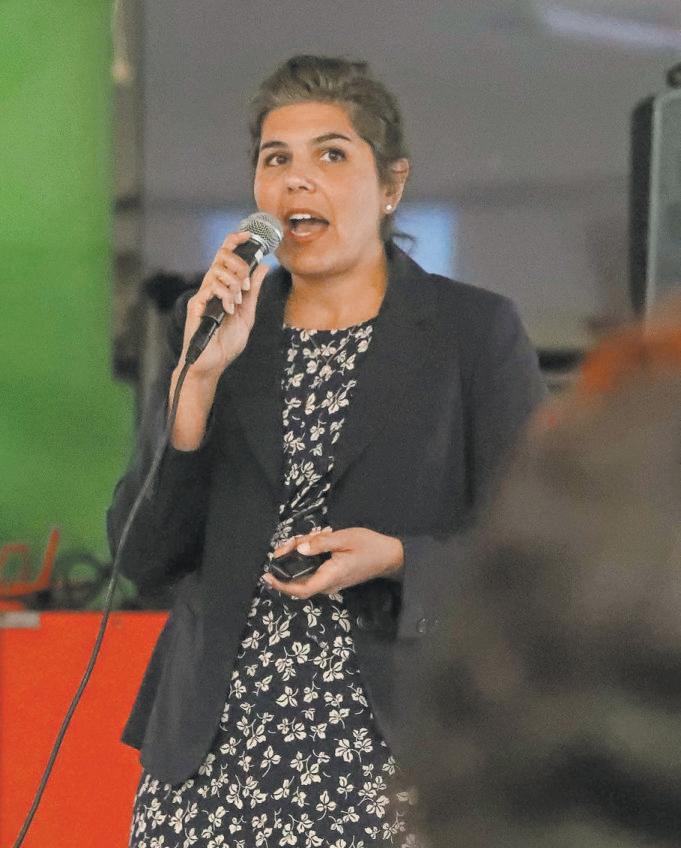
Under the leadership of HISD Superintendent Mike Miles, the district has undergone a significant transformation. These changes encompass a range of initiatives, such as reducing the district’s central office workforce by more than 500 positions,
introducing specialized “Zoom rooms” to address student behavior issues, and implementing the New Education Systems (NES) program.

These initiatives are all part of a broader framework known as “Destination 2035,” a long-term strategic plan that outlines Miles’s ambitious goals. At its core, Destination 2035 seeks to narrow the academic achievement gap among students and equip them with the skills and knowledge necessary to thrive in the workforce of 2035.

Audrey Momanaee, president of the Board, extended a warm welcome to participants, urging them to openly articulate their “vision and values” for the district. This comes as the Board embarks on the vital task of establishing goals and constraints for HISD. Two other members of the Board were present, Ric Campo and Janette Garza Lindner. It’s noteworthy that they will rotate participation with the other six managers in the upcoming meetings.
Over 8,500 students in Houston are discovering why their time outside the classroom is better spent at the YMCA’s After School program. Housed in local schools, our program gives your child endless opportunities to learn, engage, play and create.


UPCOMING MEETING SCHEDULE:

Friday, Sept. 15
6 - 7:30 p.m.
T. H. Rogers School (5840 San Felipe St.)
Saturday, Sept. 16
10 - 11:30 a.m.
Highland Heights ES (865 Paul Quinn St.)
Monday, Sept. 18
6 - 7:30 p.m.
Westside HS (14201 Briar Forest Dr.)
Tuesday, Sept. 19 6 - 7:30 p.m.
Madison HS (13719 White Heather Dr.)
Wednesday, Sept. 20 6 - 7:30 p.m.
Navarro MS (5100 Polk St.)

After School programs are better with the Y.

 By Raquel Rogers
By Raquel Rogers
Texas Southern University is beginning the 2023-24 school year with record enrollment - more than 9,000 students have registered for the fall semester according to university officials. But that feat won’t matter come November when Texas’ public universities begin tapping into a lucrative state investment pool. That’s because TSU is NOT on the list to receive funding.




In November, voters will decide on the Texas University Fund (TUF), a multibillion-dollar endowment to fund Texas’ emerging public research universities. Texas legislators approved the fund which will primarily benefit four of Texas’ public research universities: Texas Tech, the University of Houston, the University of North Texas and Texas State University.
If approved, the TUF will begin with a $3 bil investment from the Legislature, plus nearly $900 million that rolled over from an existing pool for emerging research universities, called the National Research University Fund. Emerging research universities, have to have at least $45 mil in yearly research expenditures. The state has allocated amounts for each university to use toward endowments, and it will grow with yearly additions from the state’s rainy day fund.
TSU does not qualify for the fund for a number of reasons, including the fact that the higher education board does not consider it a research institution. A declaration TSU regent James Benham vehemently disputes.
“We can point to tens of millions of dollars a year of research awards that prove that
What

we are an institution of higher learning and an institution of research that is producing quality research that’s improving the lives of the constituents that we serve and the state of Texas. I think that perception has to change immediately,” Benham said.
Benham pointed to large increases in external funding requests for research, to $73.6 million from September 2022 to March 2023, up from $29.9 million in the same time a year before.
Texas Higher Education Commissioner Harrison Keller says the university more closely aligns with a teaching mission.
“The intent is to make these universities more competitive, strong and vital, especially in areas that will be important for regional and state economic development,” Keller said. “We have more than 30 universities that are not close to the metrics for the TUF, but that’s not to say those institutions are less important or less than. I would again emphasize the diversity of our needs across the state.”
Benham believes taxpayer funding for the Texas University Fund should be equitably distributed across all state universities that don’t already have access to a state investment fund.
“A state funded endowment that’s funded by the general taxpayers of Texas should benefit all state funded institutions equally. You can share it based on current research dollars granted, or research faculty, etc. You could look at different metrics that you distribute, research and or endowment money with,” Benham said. “You could pick two or three or four measures by which you calculate the funding formula for each school to receive
distributions from this research endowment. But it would seem to me that Texas would want all research institutions that also teach like Texas Southern, to have the opportunity to participate in a state funded research endowment. It would seem to me that they would want them to be able to participate equally because the smaller schools have the most to gain from participation in such a pond.”
university officials say they are hampered by the persistent problem of trying to garner high research dollars without having the resources needed to attract them.
- Must have a $400 million endowment (TSU has a $80 mil endowment)
- Minimum of 200 Ph.D.s a year
- A Phi Beta Kappa honor society chapter
Texas Southern is far from the $45 million level required for the endowment, but school officials are working diligently to move to “Research 1” status, a national classification that designates the highest possible level of research at a university.
TSU holds a “Research 2” classification and is one of only 11 HBCUs to do so. Texas Southern hopes to become the first “Research 1,” or “R1,” HBCU.
“The hurdle to get into that $3 billion endowment is so high, that it will take us a substantial amount of time to even get there,” Benham said. “And by the time we get there, they will probably move the requirements. Just to be totally honest with what will probably happen.”
“As Texas Southern University is not eligible for the Permanent University Fund, TSU would be eligible to participate in the Texas University Fund should it meet metrics for qualification that are established in statute,” said Houston Republican Sen. Joan Huffman who introduced the fund in Austin this spring.
Huffman says TSU is free to join the endowment once it meets the criteria, but
TSU is the state’s only four-year institution not governed by a system, and many believe the institution is being punished for that. For many TSU advocates, the omission is just another slap in the face, and an example of a history of funding inequities at the university. Some believe the lack of inclusion is a direct result of TSU’s insistence on remaining independent. Sen. Borris Miles, D-Houston, whose district oversees TSU, is among those who want to see the HBCU remain independent.
“TSU was built for African Americans. It was supposed to be the university for people of color and for those reasons it needs to stay independent,” Miles said. “And it will stay independent.”
Many had hoped TSU would be able to receive part of that funding since a legislative ask in February was denied. That’s when previous president, Dr. Lesia Crumpton-Young made an unsuccessful appeal to legislators for $1 billion to expand academic, research and health and safety initiatives. That number far outpaced other schools and Benham said it was misunderstood by lawmakers. He said the university had to make such a huge request because it doesn’t have the benefit of a state endowment fund. TSU ultimately got $5 million from the $1 billion request.
Here’s a look at the funds allocated to Texas Southern University by the Texas Legislature covering the years 2012 – 2025. The figures were gathered from State House and Senate General Appropriations Act documents for the 82nd through the 88th Texas Legislatures.
To provide context, funding figures for three other area higher education institutions are also presented, including fellow HBCU Prairie View A&M University, Third Ward neighbor the University of Houston and the University of Houston-Downtown, a school with freshman admission requirements similar to, though a little higher, than TSU.
We also included a comparison of how these dollar amounts equate to funds allocated per student by dividing the appropriation amounts from the 2022-2023 school year (87th Legislative Session) by the number of students enrolled.
Here’s how the numbers shake out:

These numbers do not account for the differences in resources beyond legislative appropriations available to each school, resources that impact the overall offerings these campuses can provide for students, faculty and staff. These include things like accrued wealth (university endowments), institutional resources already on hand (libraries, labs, technology), alumni giving,
grants won (research or other), institutional collaborations, media coverage slant (generally positive or negative), etc. For example, though TSU and UH trace their origins back to the same year (1927), the amount of funding dollars has never been equal, with UH funding far surpassing dollars earmarked for TSU – whether dealing with overall amounts or amounts per student.
Thus, generationally, UH has been able to accrue an exponentially larger amount
of funds in its coffers than TSU. Moreover, these raw numbers don’t provide a financial snapshot of the percentage of Legislature-appropriated dollars going toward daily/current operations versus dollars free to create more dollars (investments in infrastructure or building and program expansions). Thus, the amount appropriated per student via the 87th Legislature numbers (TSU, $14.8K/per student vs UH $10.5K/per student) might give a false impression.
It’s very difficult to climb a ladder when the bottom rungs aren’t there.”
JAMES BENHAM
James Benham
 By Aswad Walker
By Aswad Walker
To many Bayou City newcomers, Houston’s amazing theater scene comes as a surprise. To born and bred Houstonians and the city’s more seasoned transplants, however, incredible productions and the people who create them, whatever the venue, have come to be expected.
But what no one saw coming was the Ensemble Teatre’s total dominance at the recent 2023 Houston Press Teater Awards – the annual happening honoring the city’s best and brightest plays, actors, directors, etc.
Te Ensemble, the historic, Black-owned arts epicenter, took home multiple awards in varied categories including Best Supporting Actress, Best Hair and Makeup, Best Season and Best Artistic Director, to name a few.

“Te Ensemble Teatre is a beacon in the community with a legacy that spans four plus decades,” said the Ensemble’s legendary Artistic Director Eileen Morris. “We are thrilled, honored, and blessed to be presented over nine awards by the Houston Press Theater Awards 2023.”
Founded in 1976 by the late George Hawkins, the Black theatre company has stayed true to its mission, “to preserve African American artistic expression and enlighten, entertain and enrich a diverse community.”
“Our art is inspiring, boasts legacy, is magical and rooted in Black joy while
layered in our mantra, ‘Te E is for Everyone and Everyone Counts.’ As the oldest Black professional theatre in the Southwest and one of eight Black theatres in the world that own its facility, we are resilient.
We are proud to tell our diverse stories and thankful for this Houston Press recognition. We celebrate together with our peers who embrace the creation of theatre,” added Morris.
The Ensemble kicks off its six-play 2023/24 season with the production, “Chicken & Biscuits,” written by Douglas Lyons and directed by Morris. Described as “a raucous family comedy so full of laughter and love, it’ll leave you begging for seconds,” “Chicken & Biscuits” runs from Sept. 22 – Oct. 15, 2023 with previews on Sept. 16, 17, 20 and 21. Te fnal production of the season, “Pullman Porter Blues,” runs from June 28 to July 28, 2024.
The Metropolitan Transit Authority of Harris County, Texas (METRO) is planning to issue the procurement documents listed in this advertisement. RFQ No. 4023000202: Pre-Authorization Workers’ Compensation Medical Services. Solicitation will be available on or about 08/28/2023. Prospective bidders/proposers can view and download these solicitations by visiting METRO's website at ridemetro.org/Open Procurements
If you are unable to download the documents or are having difculty, please contact 713-615-6125 or email Contracts/Property Services at propertyservices@ridemetro.org.
The Houston Independent School District Purchasing Services Department, located at 4400 West 18th Street, Houston, TX 77092, is soliciting Request for Proposals (RFP) via the District’s electronic bidding portal. Proposers may log in to view specifcations and submit their responses at the following link https:// houstonisd.ionwave.net/Login.aspx until 2:00 p.m. (CST) Tuesday, October 31, 2023, for the following solicitation:
RFP 24-08-13 Onsite Clinic Services
Pre-proposal conferences via Microsoft Teams will be held in conjunction with this RFP. Information regarding dates, times, and instructions to receive a link to join the meeting can be located within the electronic bidding portal under the “Event Details” tab specifc to this solicitation.
The Metropolitan Transit Authority of Harris County, Texas (METRO) is holding a public hearing to receive public comments on its proposed Operating and Capital Budgets for Fiscal Year 2024 (October 1, 2023 – September 30, 2024). The public hearing will be held at 11:30 a.m. on Thursday, September 21, 2023, in the METRO Board Room on the Second Floor at 1900 Main Street in Houston, Texas 77002.
The public is invited to attend the hearing and provide comments in person. You may also join the hearing on Zoom at https://us02web.zoom.us/j/86265060377 or by dialing 346-248-7799 or 888-475-4499 (toll free), Meeting ID: 862 6506 0377 Participation on Zoom is only necessary if you want to provide comments virtually during the public hearing. Otherwise, you may view a livestream of the hearing online at https://www.ridemetro.org/about/board-meetings
A video recording of the hearing will also be archived on the same page.
A copy of METRO’s proposed Fiscal Year 2024 Operating and Capital Budgets is currently available for review by the public on METRO’s website at https://metro.resourcespace.com/pages/collections featured.php?parent=16624 and in the lobby of the METRO RideStore in the Lee P. Brown METRO Administration Building, located at 1900 Main Street, Houston, Texas 77002.
It is recommended that anyone wanting to make public comments at the hearing register as a public speaker with METRO’s Board Office at least 48 hours in advance of the date of the hearing by calling 713-739-4834 or sending an email to boardoffice@ridemetro.org, and providing their name, address, and telephone number. If you pre-register, your comments will be heard first at the public hearing. Your name will be called at the appropriate time for you to make your comments.
Alternatively, you may provide public comments after the pre-registered speakers by raising your hand when called upon if you are present in the Board Room, by selecting the “Raise Hand” feature on the Zoom platform online, or by pressing *9 if joining by telephone. Those calling in will automatically be placed on mute. After an unregistered speaker’s name or number is recognized, their microphone will be unmuted and they will be able to provide their comments.
The public may also provide comments by email to Budget.Book@ridemetro.org or by calling METRO Customer Service at 713-635-4000 in advance of the public hearing.
Upon request, METRO provides free language assistance at METRO public hearings to help patrons who have a limited ability to read, write, speak, or understand English in accordance with its language assistance plan. METRO’s public hearings are also accessible to persons with disabilities. Request for language assistance and other accommodations should be directed to the Board Office at 713-739-4834 at least 48 hours in advance of the hearing.
Prostate cancer is the No. 1 form of cancer diagnosed in men. And Black men have a greater risk of getting prostate cancer – and a more aggressive type –than their Caucasian counterparts. What’s more, African Americans are more than twice as likely to die from the disease.


Early diagnosis gives physicians more treatments options with higher expectations for favorable patient outcomes. This is why it’s so important to recognize warning signs and seek early medical treatment.
In the earliest stages, prostate cancer may not present alarming symptoms, which may cause a delay in seeking medical
FROM THE DOC
“Prostate cancer is the No. 1 cancer diagnosed in men.”
Dr. Gaines is a board-certified Family Medicine physician at North Houston Campus.


intervention. As the cancer advances, however, you would likely experience hard-to-ignore problems with bladder function and painful urination.

Symptoms of more advanced prostate cancer may include:
• Frequent, sometimes painful, nighttime urinations
• Urinary blood
• Incontinence

Diagnosing prostate cancer
A physician will first check the prostate for lumps or abnormal swelling. Then, depending on your age and overall health, the doctor may recommend a prostate-specific antigen (PSA) test. This simple blood test helps measure substances that may suggest
a problem. If the doctor suspects cancer, an ultrasound test may be recommended, and a tissue sample may be taken for a biopsy.
If cancer is diagnosed, the doctor may refer you to a urologic oncologist specializing in prostate cancer. Treatment will depend on how advanced or aggressive the cancer is when diagnosed.
Be proactive about your health. See your healthcare provider for regular preventive exams that include checking your prostate, and ask about lifestyle strategies to help prevent this all-tooprevalent cancer.
Dr.Gaineswelcomesnewpatients atKelsey-Seybold’sNorthHouston Campus.
many more.
We have 38 convenient locations close to home and work –and still growing!

Women athletes are definitely making their mark in sports. Challenging established norms and redefining what it means to excel in the world of athletics.
Then when you add Black women into the mix, the magic is paramount. That is the energy 26-year-old Houston Dash Forward Michelle Alozie embodies with her skill, versatility and ambition as a rising star in women’s soccer.
Alozie stands as a testament to the evolving paradigm of athletics. As the popularity of women’s sports grows in higher ratings, sponsorship and attendance, she carries the mantle of the icons who come before her. Beyond the field, she is a Yale University graduate with a degree in microbiology and has goals to pursuing medicine as a career. Alozie made her debut for the Nigerian national team during the 2023 FIFA Women’s World Cup. Her stellar performance as a defensive player has cemented her as inspiration to aspiring athletes and young girls everywhere.
The Defender spoke to Alozie about her passion for soccer and her vision for the future of women’s sports.

DEFENDER: Howhasitbeenforyou to move to Houston from California toplayfortheHoustonDashand fullyembracelivingoutyourdreamin the city?
Michelle Alozie: Coming from California wasn’t too crazy. I came out here with my sister as well so it was actually nice to have a familial bond here. Being here is honestly a dream. Houston has a lot of Nigerians so I love that. Being surrounded by people who come from the same culture as me has been beautiful. It’s almost like a mini Lagos some might say. It’s everything I could’ve wanted. It’s definitely a crazy path that has taken me to where I am now. I wouldn’t have changed it any other way.
DEFENDER: Howdoyou balanceyour academic pursuitswith playing soccer?

Alozie: I got my degree in molecular biology at Yale. I knew medicine was always going to be something that I wanted to do as my career. Obviously, soccer came first. It’s something that has limited time just because my body won’t run forever. I knew that it was a passion of mine that I wanted to do first. So, coming here, being at Texas Medical Center, which is literally the best medical center in the country, it was honestly a great coincidence. I’m a research technician at Texas Children’s Hospital. I’m able to balance it because I’ve always been used to juggling academics and sports throughout my whole life. That’s what I had to do as a college athlete. Since I’m passionate about this, it’s easy to be able to split up my time.
DEFENDER: How has growing up as a Nigerian in the diaspora influenced your approach to the game and life?


Alozie: Growing up Nigerian, I feel like you have to be a tough cookie. Even in the diaspora, I feel like it’s all the same. My parents instilled in me hard work and if I want to do something, especially if it’s something that’s a little bit off the normal path that they would have wanted me to be on. I have to go 100% and give it my all. That’s what I’m doing in soccer now and they are proud. Soccer is in our culture, its ingrained in me to love this sport. They love it. All my siblings played it, my uncles, and my dad. It was natural.

DEFENDER: What is it like foryou day in and out as a young athlete to prepare for that competitive level?
Alozie: I’m still trying to be the best athlete I can be. I’m used to getting warming up and going running. I’m getting a little older so I need to take care of my body. Recovery is important. I make sure I’m doing my rehab and activation. I’m in top shape not just for myself but for my team. I’m making sure I’m hydrated especially in this Houston heat, and get my carbs in and make sure my body is and mental is completely ready for the game.
DEFENDER: There has been an increase in recognition in women’s sports throughout the years.What are your thoughts on this and what do you hope to see in the future forwomen’s sports?
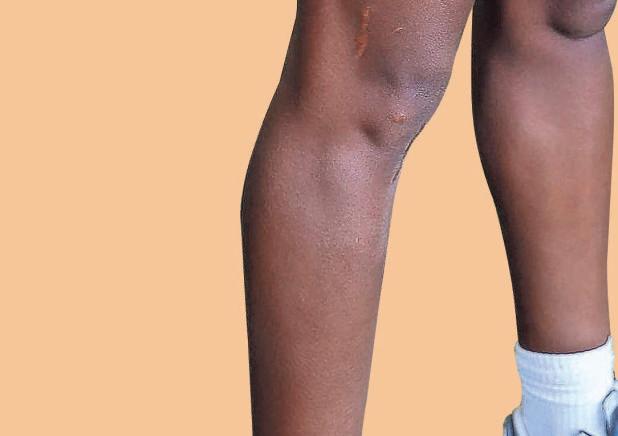


Alozie: It’s about time! I know this past world cup has broken many records with viewership and partnerships with revenue. It’s just the start. If people haven’t thought about investing in women’s sports now or then, they definitely should. Look at these numbers. We are busting out butts as hard as anyone. We put a lot of things on the back burner just so that we can perform. I think that we’re finally getting to the point where women’s sports is just as important as any other sport especially in America. It’s beautiful to see.

DEFENDER: What advice do you have for aspiring athletes who want to be where you are one day?
Alozie: Trust your journey. I don’t think anyone expected me to be here. I didn’t expect myself to be here with the way my journey was going. Just because it’s not the journey where you’re going to a power five school, getting drafted top 10, and then you start your rookie year. None of that really matters at the end of the day. Trust your journey no matter what the path looks like. Make sure you believe in yourself and follow through.

For far too many men, conversations about the prostate are avoided like the plague. But Ronald Galvin, a prostate cancer survivor, actively seeks opportunities to share his story and encourage men and those who love them to make discussions about prostate cancer and treatments a healthy part of our regular dialogues.
Tough Galvin has had many job titles, including entrepreneur and minister, at the core of his work is community building and empowerment. Part of that empowerment work involves making sure Black men are knowledgeable about prostate health and the importance of having a partner and support system around them. For Galvin, his wife, Dr. Yanique Redwood, executive director of the Boston University Center for Antiracist Research, and author of “White Women Cry and Call Me Angry,” has been a huge part of his journey to health.
Galvin openly shared that journey with the Defender.
DEFENDER: What is your prostate cancer story?
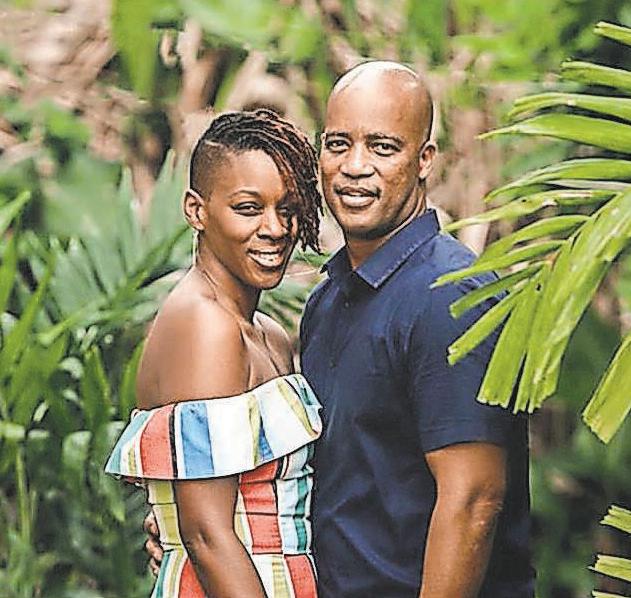
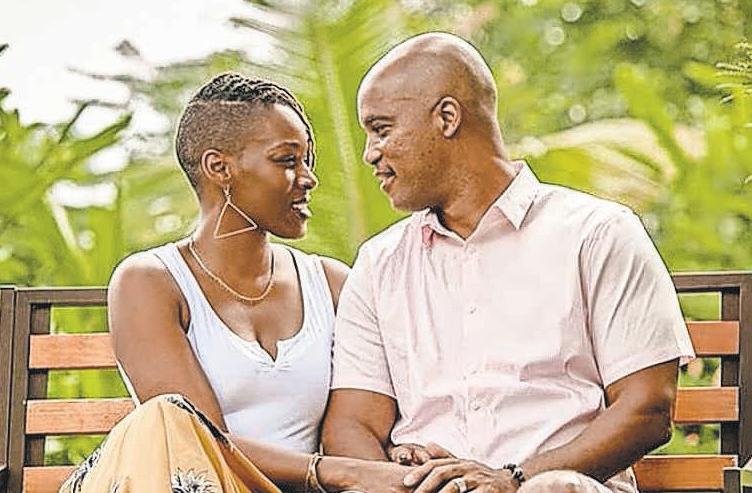
RONALD GALVIN: What had happened was, I was minding my business, Yanique and I were in Atlanta, and I was having some discomfort in my prostate area. Now, prostate cancer, particularly early stages, is a slow-developing cancer. It’s on you and you don’t even know it’s there. But, I was having some infammation. I was going back and forth to the doctor and they gave me some antibiotics. I took the antibiotics and I went back for a follow-up with my general practitioner doctor. Just
a checkup. But he asked was I still feeling discomfort. I said, “Nah; it’s gone.” He said, “Tell me about your family history.” My father had prostate cancer when he was in his late ffies, maybe early sixties. Te doctor told me to get another PSA (Prostate-Specifc Antigen Test), and it was just slightly high. He said, “You know what?
Let’s do a biopsy.” I got the biopsy, and I’m thinking, “Whatever.” But three, four days later, I get a call from Emory Hospital: “We found some things that are concerning in the biopsy.” And just like that, I found out I had prostate cancer, and I was lucky.
DEFENDER: Lucky? How so?
Galvin: I was lucky because they caught it super early. Tey said, “We don’t usually even see it this early.” I was 40 years old. Te guy at Emory told me to get a second opinion from a guy I should talk to over at Piedmont Hospital. Te guy was Warren Bufett’s doctor. He tells me, “It looks like you’re gonna have to deal with this because your father had it.” Te study had just come out from Harvard University, and there was evidence that said if your father had prostate cancer, sons were getting it 10 years earlier. I went to a third doctor over at Morehouse. He talked about how vitamin D defciency, not getting enough sun because I was in ofces working all the time, could have been a factor.
DEFENDER: Howblessedwereyou? Not everyone has a doctor who would’veaskedthequestionsyour doctorasked.
GALVIN: And the blessedness and good fortune in all this kept compounding throughout the whole process. You know how pastors say, “Surely goodness and mercy, will follow me”? It was hounding me all through this process. And, that’s what I wanna convey to the brothers who are wrestling with this. It does not have to be a traumatic, painful, stress-induced process. I mean, there’s certainly concern when there’s cancer in your body. But there’s so much technology out there today that didn’t even exist when I was diagnosed. And the technology was actually pretty good when I had my surgery. But it can actually be a healing process. You can actually come out better on the other side.
DEFENDER: Howdid the news hit youemotionallywhenyoufound out?
GALVIN: First, I was like, “Nah; not me. I’m 40.” Tat lasted for about, believe it or not, an hour or two. And I don’t know if this is a coping mechanism for me, but I quickly moved to, “Okay, I have it.” And that’s where I got stuck. I was like, “What do I do?” Tat’s where a lot of people get stuck. Today, there’s so many options, but literally, I was like, “What do I do next?” But emotionally, it hit me like a ton of bricks initially. But I wasn’t stuck long. And a lot of it had to do with my partner who has a PhD in public health who, at the time was doing epidemiology work at the CDC and understands how to move in and out of the health system.
I want to convey to the brothers who are wrestling with this… There’s certainly concern when there’s cancer in your body. But there’s so much technology on the other side.”
RONALD GALVINDr. Yanique Redwood and Ronald Galvin. Photo courtesy Dr. Redwood. Ronald Galvin (right) with wife Dr. Yanique Redwood. Photo courtesy Dr. Yanique Redwood.
Prairie View running back Ahmad Antoine rushed for 103 yards and 16 carries, averaging 6.4 yards per carry in the 45-16 loss to Abilene Christian.

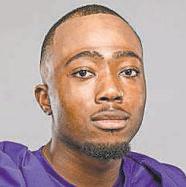

Astros manager Dusty Baker is having to respond to speculation that he isn’t playing outfielder Chas McCormick because he has issues with him. McCormick had been missing from the lineup frequently which apparently has bothered some within the Astros organization, according to The Athletic. Baker was said to not be pleased with McCormick’s playing weight which was 12 pounds over where it’s listed. “As far as my not liking Chas, I don’t know where that is coming from at all,” Baker said. “It seems like somebody has something against me, they ought to use it against me and not use my players against me.”



For the third straight year, the Texas Southern University Department of Athletics received a NCAA Accelerating Academic Success Program grant. TSU is one of 11 Division I schools to receive the grant which totals $100,000. This marks the sixth time TSU has received the grant and the third consecutive year the program was awarded a substantial amount. A selection committee made up of member school representatives awards the funding each year. “Our academic staff, which is led by Assistant Athletics Director / Academic Enhancement Kimberly Evans, has done an outstanding job in utilizing our grant funds from previous awards to develop initiatives which have helped our student-athletes prepare for life once their playing careers have concluded,” said TSU athletic director Kevin Granger.
Trazon Connley receives SWAC weekly honor
Prairie View quarterback


Trazon Connley was named the SWAC Offensive Player of the Week after leading the Panthers to the 37-34 overtime win over Texas Southern in the seasonopening Labor Day Classic. Connley, a senior, passed for 275 yards and three touchdowns on 20-of-33 passing while also rushing for 35 yards against the Tigers.


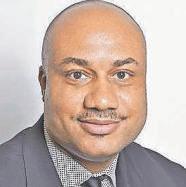
 By Terrance Harris
By Terrance Harris

Just sitting back thinking about his journey from undersized walk-on defensive lineman at Texas Southern to being the Tigers’ star linebacker, “crazy” is the best description Jacob Williams can come up with.
Words like “miraculous,” “perseverance” and “conquering” could also come to mind.
But in reality, even a kid who always dreamed bigger than his stature couldn’t have seen this coming.
“I had some doubts, just being a human, thinking the coaches are not going to really notice me or trust me because I came from a D-line position,” said Williams, a 6-foot, 210 junior linebacker. “But it’s turned out great. I just had to make it where they believed in me. I just had to work my butt off and I just got them to believe in me. I had to make them believe in me.”
He has been trusted so much that Williams is the Tigers’ defensive leader and the soul of the unit. Through the first two games – both losses – Williams is second in the SWAC in tackles with 25 total stops and he is at the top of the conference in tackles for loss (4.5) and sacks (three for minus-24 yards).

“He missed the second half of last season and our defense didn’t play as well as they did when he was there,” said TSU coach Clarence McKinney. “We are fortunate to be able to have him back. He is the leader of the defense. He is our leading tackler.”
McKinney added, “We ask him to do a lot of things, getting our guys lined up, stopping the run to rushing the passer. He is a special talent and we are excited having him back. I love watching him play ball and do his thing at a high level.”
Williams was on his way to having an impressive season in 2022 before an injury cut it short. He has seemingly picked up where he left off, producing 12 tackles, three sacks and 3.5 tackles for loss in the narrow overtime loss to Prairie View to open the season. Then Williams led the Tigers with 13 stops this past weekend during a tough 71-3 loss at Toledo.
“It was amazing, going out there and being active with my brothers, people I go to war with,” Williams said after the season-opener against Prairie View. “It was fun. Unfortunately, we didn’t get the win. Next time we’ve got to come away with it.”
The Tigers’ defense is expected to be improved under new defensive coordinator
Everett Todd. Williams is going to be a big part of that improvement, after shifting from the weakside linebacker spot to the middle where he is still responsible for making plays but now must also get the entire linebacker corp lined up in the right spots.
Williams attributes linebackers coach and co-defensive coordinator Derrick Mathews with helping make the transition an easy one.
“It’s not too much different,” he said. “Coach D. Mat tries not to make it too complicated for us. So, it hasn’t been a big, big difference playing in the middle. You just have to get a little more physical with them, but it’s kind of the same thing for the most part.”
A big part of Williams’ growth has been because he is a student of the game. He spends extra time working with Mathews going over the playbook and watching film. When he is not at the football facility, he and his twin brother, Isaac, who is a student assistant coach at TSU, spend hours discussing the game plan and how he can get better.
Williams also devotes time to watching NFL greats Ray Lewis and Luke Kuechly, two players he tries to pattern his game after.
“I just watched greats like those two and I just tried to relate to them,” Williams said. “Then also using what Coach D. Mat gives me and he gives me great knowledge of the game. He is one of the best coaches you can ask for at the linebacker position and I’m just thankful for him.”
His coaches in return are thankful for him.
“For this day and age of football, he is the perfect linebacker versus spread offenses,” said McKinney, whose team travels over to Rice this weekend. “He can pressure, he can drop into coverage, he really can do it all. He is an athletic and talented kid. He studies the game, he does a tremendous amount of film work as far as studying his opponent. He is a smart football player.”
Williams is quick to deflect the attention away from himself and turn it to his defensive teammates and the team’s overall goals this season.
“We have a high ceiling,” he said. “We just have to keep working. We have to come to practice and get one percent better every day. We have great players and great coaches. This can be a great, great season.”

 By Jimmie Aggison
By Jimmie Aggison
Last season, the Booker T. Washington Eagles (BTW) went a perfect 6-0 in 4A Region III District 11. They made it to the playoffs, but lost a close one in the first round to Brazosport. This season with a new coach and younger players, the Eagles hope to return to the playoffs and rewrite history in their favor.

Leading the defense this year is a talented senior at the safety position, Avery Ina.
“He means a lot to this team, leading the defense,” said BTW head coach Don Holloway. “He’s a returning starter who played outside linebacker last season, but we’ve moved him to safety this season. We have a lot of freshmen this year, but he makes sure they know what they’re doing as they move fast and it’s 11 hats to the ball.”
Ina began playing football when he was five years old, with the Atascocita Titans in Humble Area Youth Football.


“Watching football young, and seeing the passion that grown men had for the game, motivated me to want to do something with my life,” said Ina.
Ina went on to play at Woodcreek Middle School. He played his freshman year at
Class: 2024
IG: @kriss.2x
Twitter: @AveryIna3
Position: Safety
Height & weight: 6-feet-1, 190 pounds

Players he studies: Kam


Chancellor, Ray Lewis
Status: Uncommitted
Favorite artist: New Edition
Favorite subject: English
Shout-outs: Mom, dad, Coach Holloway, teammates
Summer Creek in Humble ISD, but in his sophomore season, he moved to Washington in HISD and was given the opportunity to play varsity.
“It was a different experience, as a sophomore playing varsity, I was nervous playing with upperclassmen. I didn’t really know the system or scheme in detail, but it was good. It was a good experience for me,” said Ina.

After the Eagles capped off a perfect season in district with several win margins over 40 points, Ina was nominated second-team all-district.
“I feel like I got cheated, but I told myself that I was going to come out this year and make a name for myself and make sure I got first-team all-district this year,” said Ina.
To improve his skill level and accomplish his goal, during the off-season Ina found inspiration from several NFL athletes.
“I studied Kam Chancellor, Ray Lewis, Brian Dawkins, Sean Taylor, and Ed Reed,” said Ina. “I stayed in the weight room to get stronger and worked with my teammates to build team chemistry. I also worked with the ladder and cone drills to improve my speed and agility.”

Ina plans to study business and marketing with hopes of one day owning his own clothing line. And although he has not committed to a college, he does want to play football at the collegiate level.
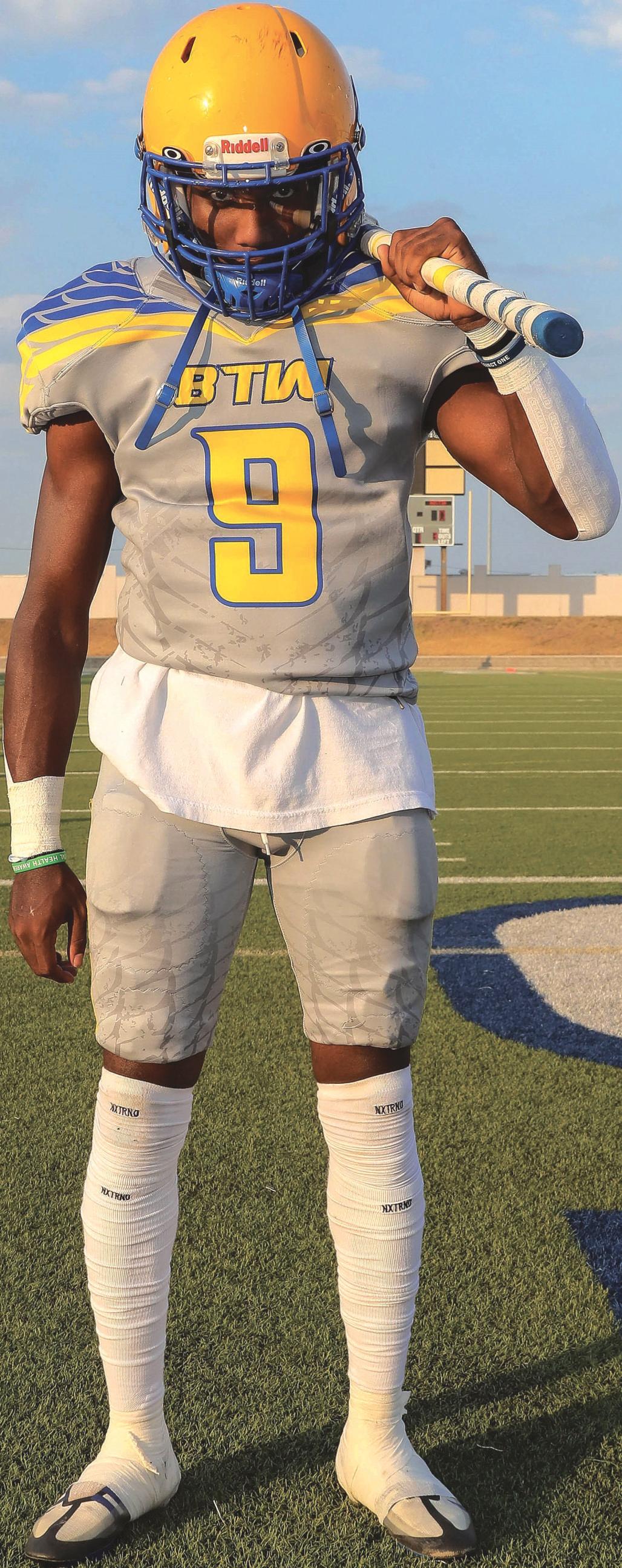

“I’m looking for a team that has a family atmosphere, competing for championships and a place where I can play ball and have fun,” said Ina.
Looking back over his career, Ina hopes to inspire the next wave of defensive leaders to put in the work and get the most out of their game.
“It isn’t easy. It’s a grind every day. Yes, you’re going to have disagreements with teammates and coaches, but at the end of the day, you all have the same goals: win, make the playoffs and compete for a state championship,” said Ina.
